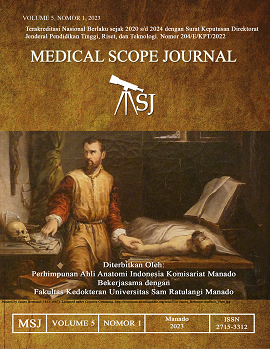Gambaran Depresi pada Siswa SMP di Kecamatan Malalayang yang Menyandang Obesitas
DOI:
https://doi.org/10.35790/msj.v5i1.45115Abstract
Abstract: Obesity is caused by various factors such as environment, socioculture, genetics, and others. This condition is found among adults and adolescents. Obesity can cause various types of health problems, one of which is depression. This study aimed to obtain the description of depression among obese junior high school students in Malalayang Sub-District. This was a quantitative descriptive study followed by a qualitative study in the form of in-depth interviews. The results obtained 73 obese students as respondents. Forty-seven students suffered from depression consisting of 40 students with mild depression and seven students with moderate depression. The causes of depression were diverse inter alia family problems, difficulties in learning, and bullying by peers. In conclusion, most obese junior high school students in Malalayang Sub-District suffered from depression especially mild depression with varied causes.
Keywords: adolescent; obesity; depression; causes of depression
Abstrak: Obesitas merupakan salah satu masalah kesehatan global yang disebabkan oleh berbagai macam faktor seperti lingkungan, sosiokultural, genetik, dan lainnya. Kejadian obesitas ditemukan baik pada dewasa maupun remaja. Obesitas dapat menyebabkan berbagai jenis masalah kesehatan salah satunya ialah depresi. Penelitian ini bertujuan untuk mengetahui gambaran depresi pada siswa Sekolah Menengah Pertama yang mengalami obesitas di Kecamatan Malalayang. Jenis penelitian ini ialah deskriptif kuantitatif yang dilanjutkan dengan penelitian kualitatif berupa wawancara mendalam. Hasil penelitian mendapatkan 73 siswa obes sebagai responden penelitian. Terdapat 47 siswa obes yang mengalami depresi, dengan 40 siswa yang mengalami depresi ringan dan tujuh siswa yang mengalami depresi sedang. Penyebab depresi sangat beragam dimulai dari masalah keluarga, kesulitan dalam pelajaran hingga perundungan yang dilakukan oleh teman-teman sebaya. Simpulan penelitian ini ialah hampir sebagian besar siswa SMP penyandang obesitas di Kecamatan Malalayang mengalami depresi terutama depresi ringan, dengan penyebab beragam.
Kata kunci: remaja; obesitas; depresi; penyebab depresi
References
World Health Organization. Obesity and overweight [Internet]. 2021. Available from: https://www.who.int/news-room/fact-sheets/detail/obesity-and-overweight.
Kemenkes RI. Laporan Nasional Riskesdas 2018 [Internet]. 2018. Available from: http://labdata. litbang.kemkes.go.id/ccount/click.php?id=19
Kemenkes RI. Laporan Nasional Riskesdas 2013 [Internet]. 2013. Available from: http://labdata. litbang.kemkes.go.id/ccount/click.php?id=1.
Gadde KM, Martin CK, Berthoud H-R, Heymsfield SB. Obesity: pathophysiology and management. J Am Coll Cardiol [Internet]. 2018;71(1):69–84. Available from: https://www.ncbi.nlm.nih. gov/pmc/articles/PMC7958889
Fruh SM. Obesity: risk factors, complications, and strategies for sustainable long‐term weight management. Journal of the American Association of Nurse Practitioners [JAANP]. 2017; 29(S1):S3–14. Available from: https://www.ncbi.nlm.nih.gov/pmc/articles/PMC6088226
Chand SP, Arif. H. Depression [Internet]. Treasure Island (FL): StatPearls Publishing; 2022. Available from: https://www.ncbi.nlm.nih.gov/books/NBK430847/
Hung C-I, Liu C-Y, Yang C-H. Untreated duration predicted the severity of depression at the two-year follow-up point. PLOS ONE [Internet]. 2017;12(9):1–11. Available from: https://www.ncbi. nlm.nih.gov/pmc/articles/PMC5608308
Nemiary D, Shim R, Mattox G, Holden K. The relationship between obesity and depression among adolescents. Psychiatric Annals [Internet]. 2012;42(8):305–8. Available from: https://www. ncbi.nlm.nih.gov/pmc/articles/PMC3749079
Rakasiwi LS, Kautsar A. Pengaruh faktor demografi dan sosial ekonomi terhadap status kesehatan individu di Indonesia. Kajian Ekonomi & Keuangan [Internet]. 2021;5(2):146-57. Available from: https://fiskal.kemenkeu.go.id/ejournal/index.php/kek/article/view/1008/305
Koenig LR, Blum RW, Shervington D, Green J, Li M, Tabana H, et al. Unequal gender norms are related to symptoms of depression among young adolescents: a cross-sectional, cross-cultural study. J Adolesc Health. 2021;69(1S):S47-S55. Available from: https://pubmed.ncbi.nlm.nih. gov/34217459/
Darmayanti N. Meta-Analisis: Gender dan depresi pada remaja. Jurnal Psikologi. 2008;35(2):164-80.
Annahar CN, Hendrati LY. Faktor yang berhubungan dengan depresi pada remaja overweight-obesitas di Kabupaten Jombang. Jurnal Ilmu Kesehatan Masyarakat [Internet]. 2022;18(2):63-71. Available from: https://jurnal.unej.ac.id/index.php/IKESMA/article/view/27165
Cash TF. Body image: past, present, and future. Body Image [Internet]. 2004;1(1):1-4. Available from: https://www.sciencedirect.com/science/ article/abs/pii/S174014450300011
Weinberger N-A, Kersting A, Riedel-Heller SG, Luck-Sikorski C. Body dissatisfaction in individuals with obesity compared to normal-weight individuals: a systematic review and meta-analysis. Obesity facts [Internet]. 2016;9(6):424-41. Available from: https://www.ncbi.nlm.nih.gov/ pmc/articles/PMC5644896
Singleton C, Kenny TE, Hallett D, Carter JC. Depression partially mediates the association between binge eating disorder and health-related quality of life. Front Psychol [Internet]. 2019;10(209): 1-8. Available from: https://www.ncbi.nlm.nih.gov/pmc/articles/PMC6399201
Fatima Y, Doi S, Mamun A. Sleep quality and obesity in young subjects: a meta-analysis. Obes Rev [Internet]. 2016;17(11):1154-66. Available from: https://pubmed.ncbi.nlm.nih.gov/27417913/
Hagen EW, Starke SJ, Peppard PE. The association between sleep duration and leptin, ghrelin, and adiponectin among children and adolescents. Curr Sleep Med Rep [Internet]. 2015;1:185-94. Available from: https://link.springer.com/article/10.1007/s40675-015-0025-9#Sec4
Araghi MH, Jagielski A, Neira I, Brown A, Higgs S, Neil Thomas G, et al. The complex associations among sleep quality, anxiety-depression, and quality of life in patients with extreme obesity. Sleep [Internet]. 2013;36(12):1859-64. Available from: https://www.ncbi.nlm.nih.gov/pmc/ articles/PMC3825435
Xu F, Cui W, Xing T, Parkinson M. Family Socioeconomic status and adolescent depressive symptoms in a Chinese low– and middle– income sample: the indirect effects of maternal care and adolescent sense of coherence. Front Psychol [Internet]. 2019;10(819):1-9. Available from: https://www.ncbi.nlm.nih.gov/pmc/articles/PMC6470245
Waylen A, Stewartbrown S. Factors influencing parenting in early childhood: a prospective longitudinal study focusing on change. Child Care Health Dev. 2010;36(2):198-207. Available from: https://pubmed.ncbi.nlm.nih.gov/20015278/
Devenish B, Hooley M, Mellor D. The pathways between socioeconomic status and adolescent outcomes: a systematic review. Am J Community Psychol [Internet]. 2017;59(1):219-38. Available from: https://pubmed.ncbi.nlm.nih.gov/28127777/
Park HY, Heo J, Subramanian SV, Kawachi I, Oh J. Socioeconomic inequalities in adolescent depression in South Korea: a multilevel analysis. PLOS ONE [Internet]. 2012;7(10):1-7. Available from: https://journals.plos.org/plosone/article?id=10.1371/journal.pone.0047025.
Downloads
Published
How to Cite
Issue
Section
License
Copyright (c) 2023 Stephen Inkiriwang, Anita E. Dundu, Theresia M. D. Kaunang

This work is licensed under a Creative Commons Attribution-NonCommercial 4.0 International License.
COPYRIGHT
Authors who publish with this journal agree to the following terms:
Authors hold their copyright and grant this journal the privilege of first publication, with the work simultaneously licensed under a Creative Commons Attribution License that permits others to impart the work with an acknowledgment of the work's origin and initial publication by this journal.
Authors can enter into separate or additional contractual arrangements for the non-exclusive distribution of the journal's published version of the work (for example, post it to an institutional repository or publish it in a book), with an acknowledgment of its underlying publication in this journal.
Authors are permitted and encouraged to post their work online (for example, in institutional repositories or on their website) as it can lead to productive exchanges, as well as earlier and greater citation of the published work (See The Effect of Open Access).










